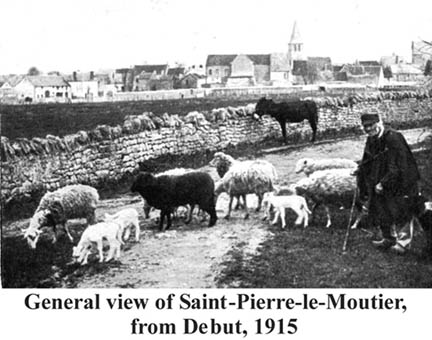
Jehanne la Pucelle
A mini-biography
(Joan the Maid, commonly called Joan of Arc in English)
Compiled from many sources by Steven R. Kanehl
Part 7


Early in the month –At Saint-Pierre-le-Moustier. Jean d’Aulon rides up to her on the battlefield. Only 4 or 5 men are left as the others have retreated. He asks her why she is still there, virtually alone. She takes off her helmet and replies she is not alone, but has a company of 50,000 (angels) with her (Jehanne, when wearing her helmet on the battlefield, always kept the visor up so her troops could see her face. This time she removed her helmet completely). She turns to her troops and encourages them "All fall to the faggots and hurdles! We must make a bridge." Jehanne captures Saint-Pierre-le-Moustier.
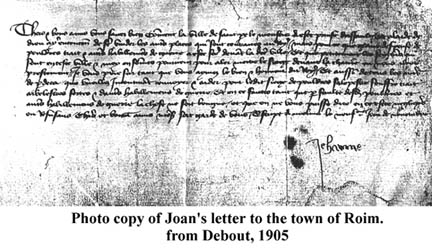
The 9th
– She writes a letter to the town of Riom to request supplies. She seals the letter with her fingerprint and a single strand of her black hair. The hair was last seen in 1844, but its present whereabouts is not known. The town promises supplies, but does not deliver them.
1st half of November
- Jehanne almost assuredly meets Sainte Colette de Corbie in Moulins. Jehanne’s friend, Maire de Bourbon, is also the foundress of the convent at Moulins. All three are present in Moulins during this time period. Jehanne prays frequently and at great length in the chapel of the Poor Claires, the very Order to which Colette belongs, and the very chapel attached to Colette’s convent. Colette once interfered in the negotiations between the Dauphin and the Duke of Burgundy, which would have given these two great women even more in common to talk about.
The 20th (?)
– Jehanne writes a letter to King Charles dismissing the claims of Catherine La Rochelle’s vision of a White Lady who says Charles will find hidden treasure to pay his army (see October 1429 notes).
The 24th
– A siege on La Charite-sur-Loire, started perhaps several weeks ago, is called off due to lack of money to pay the army, no supplies, and the coming winter.
Jehanne is likely with the royal court at Meung-Sur-Yvette most of the time.
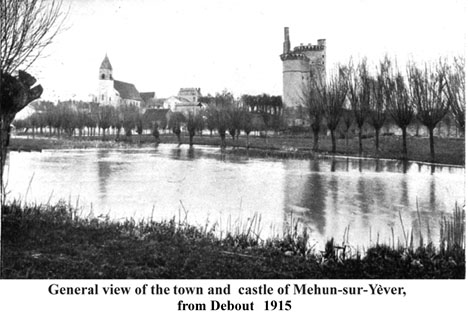
25
– Jehanne is at Jargeau for Christmas29
– Jehanne’s family is ennobled with the surname of du Lys
Sometime this month Jehanne writes a letter to the leading citizens of Tours to request a marriage-dowry for her friend Heliote-Poulnoir, the daughter of the Scottish painter who had executed her banner and pennon. The city is thrown somewhat into a panic and some three weeks later responds that the public funds cannot be found to accommodate this request. However, for the honor and love of the Pucelle, the bride would receive prayers from the citizens, and bread and red and white wine on the day of her benediction.
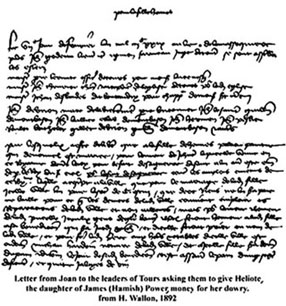
Jehanne also meets La Pieronne, a Breton visionary. She claimed God appeared to her dressed in a long white robe with a scarlet tunic and addressed her as one friend might speak to another. La Pieronne defended Jehanne after she was taken prisoner, and was herself burnt at the stake (September 1430) for her support, as well as for blasphemy.
Probably spent much of the month with the royal court at Meung-sur-Yevre.
The 19th
- Jehanne is at Orleans and presented with 52 pints of wine, 6 capons, 9 partridges, 13 rabbits, a pheasant, and a doublet for brother. She rents a house, perhaps for her mother to live in.
Jehanne probably spends much of the month with the royal court at Meung-sur-Yevre. The royal court leaves on February 15th for Sully-sur-Loire.

Friday, the 3rd
– Jehanne joins the royal court at Sully-sur-Loire.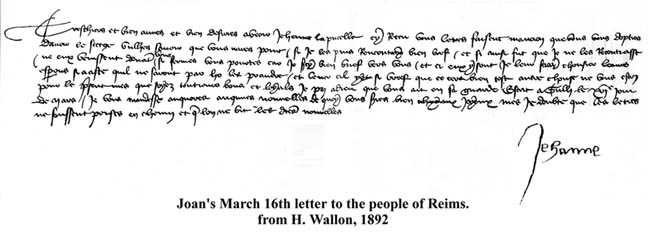
Thursday, the 16th
– Jehanne dictates a letter to Reims. She says "Very good and well beloved friends whom I wish greatly to see again, Joan the Maid has received your letters, which mention that you fear that you will be besieged. Know well that you should not be distressed if I can confront them (she means the Burgundians). If they come near, shut your gates, for I will be very direct with you; if they come I will make them fasten on their spurs so fast that they will not know how to put them on and get out of there, and very quickly at that. I will write you nothing more at present, but pray remain good and loyal. I pray God to keep you safe." The original letter is still preserved and carries Jehanne’s own signature.
Thursday, March 23rd
– A letter is written to the Hussites in Bohemia by Jehanne’s priest Pasquerel. Jehanne’s name is used a "threat" to attack them if they do not reform and return to the Catholic faith. Many think Jehanne knew nothing about this letter. Certainly reforming the Hussites was not mentioned by her as part of her mission by God.
Tuesday, the 28th
– The king’s court learns that certain citizens of Reims are plotting to surrender the town to the Burgundians. Jehanne dictates another letter to Reims. "Very dear and good friends, it has been reported to the king that in the good city of Reims there are also many wicked people", but she adds that the king knew the great majority of Reims were faithful to him. "Believe that you are well in his grace, and if you have to fight, he would assist you in the event of any siege; and he knows very well that you would have much to suffer because of the hardships that these treasonous Burgundian adversaries have imposed on you." This letter is also preserved and carries Jehanne’s own signature.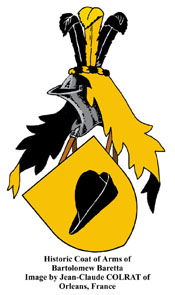 Wednesday, the 29th – Jehanne goes to Lagny. She has with her volunteers of the troops of the mercenary Berthelemy Baretta as well as some 200 men from the Italian Piedmont. Lagny is due east of Paris and on the route to Compiegne. Some say Jehanne apparently launches this campaign without the King’s express permission. Others surmise this was not an open defiance, in that she already was free to go as she pleased. She has learned that the Duke of Burgundy intends to take Compiegne by force. Compiegne, although loyal to Charles, has been left to their own defenses by Charles’ ill-advised treaty negotiations with the Duke of Burgundy.
Wednesday, the 29th – Jehanne goes to Lagny. She has with her volunteers of the troops of the mercenary Berthelemy Baretta as well as some 200 men from the Italian Piedmont. Lagny is due east of Paris and on the route to Compiegne. Some say Jehanne apparently launches this campaign without the King’s express permission. Others surmise this was not an open defiance, in that she already was free to go as she pleased. She has learned that the Duke of Burgundy intends to take Compiegne by force. Compiegne, although loyal to Charles, has been left to their own defenses by Charles’ ill-advised treaty negotiations with the Duke of Burgundy.
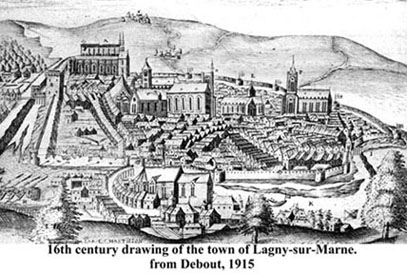
Early in April, while at Lagny, Jehanne happens upon a group of women praying. One young mother is holding a baby son that had showed no signs of life for three days. The baby has turned black. They beg her to help them. Jehanne kneels down and joins the group in prayer in front of a statute of Our Lady. God grants the group a miracle! Soon thereafter the baby yawns three times and its color returns. The baby lives long enough to be baptized and is able to be buried in hallowed ground.
Jehanne learns that Franquet d’Arras, a mercenary, has departed Paris headed north with a troop of 300-400 Anglo-Burgundian soldiers. They are a mixture of men-at-arms and archers. Jehanne commands a troop of more than 400 men, most of them cavalry. She heads out to meet him in battle. D’Arras does not effectively deploy his archers and stations his men with their backs to a hedge; they are unable to maneuver or retreat. Jehanne makes two charges down on them and the third charge finishes off the attack. Most of Arras’ men are killed or captured and Arras surrenders to the Maid herself. She keeps his sword offered to her in surrender. This would be Jehanne’s final military victory. All of her remaining victories would be on the spiritual battlefield.
The miraculous sword of Fierbois makes it last appearance at the battle of Lagny. Jehanne stated that after this battle she carried the captured Burgundian sword. She would not answer at the trial what happened to the Fierbois sword. A story survives which says that she breaks the sword by hitting a camp prostitute with the flat of it over the back. Charles is displeased, thinking this a bad omen and told Jehanne she should have used a stick. The royal armorers attempt to repair the sword, but are unable to do so, which is taken as an additional proof of its divine origin.
Jehanne seeks to ransom Arras for a French prisoner, Jacquet Guillaume. Guillaume had been captured in a plot to overthrow the English in Paris. However, she learns that Guilaume has been executed. Jehanne surrenders Arras to the townspeople of Senlis, who want to try him for war crimes of murder, theft and treason. He is ultimately convicted and executed two weeks later. At the trial, Jehanne is accused of breaking some chivilristic code in that she has turned Arras over for trial after first offering him for ransom.
Jehanne turns south toward Melun. An English garrison there is driven out by the townspeople upon hearing the news the Maid approaches their town.
Between April 17 to the 22nd
– Jehanne is at Melun. The voices tell her it is God’s will that she be captured before St. John’s Day (June 24). The voices tell her to not be amazed, but to take it favorably and that God would aid her. Jehanne asks that she might be allowed to die straightaway and not suffer a long torment in prison. The voices said she should take it all well and that it was necessary that it be so. Jehanne asks her voices many times to tell her the hour of her capture, but they do not tell her.During April, the Duke of Bedford is in England attempting to recruit troops for the French campaign. He runs into much difficulty and is forced to utilize threats and the drafting of soldiers. He complains in a letter that many men had refused to go to France "through fear of the devices of the Maid."
The 24th
– Jehanne is at Senlis awaiting reinforcements from Charles. The record of her whereabouts now goes silent until May 14th when a reception is held in her honor in Compiegne.
May 1430
(?) The 14th
– Sackville-West mentions this incident as occurring on the 14th, but the date seems to conflict with the reception held that evening in her honor back in Compiegne. It seems unlikely should would have been at a battle at dawn and then travel almost 20 miles in time for a reception. Sackville-West does not mention the reception. Jehanne has left Compiegne and travels north almost 20 miles for Pont l’Eveque, which they attack at dawn. The bridge over the Oise River is the objective. They are close to capturing the bridge, when Burgundian reinforcements from Noyon (two miles to the north) arrive to drive Jehanne back. Jehanne returns to Compiegne.
Sunday, the 14th
– Jehanne is in Compiegne for a reception in her honor. The Archbishop of Reims (most often opposed to Jehanne’s mission, sometimes in secret) and the Count of Vendome, Louis de Bourbon, are in attendance. We do not know what she has done for the past 20 days. No doubt the thought of capture has weighed on her mind. During this time Charles has become convinced that a neutrality treaty with the Duke of Burgundy was a mistake; even the Archbishop of Reims has agreed.
Tuesday, the 16th
– The Burgundians capture Choisy on the north bank of the Aisne and control an important bridge. Jehanne may have joined the battle near its end, but must return to Compiegne.
Wednesday, the 17th
– Jehanne leaves with the aforementioned Archbishop and Count and her troops toward Soissons, over 20 miles to the east. She wants to cross the Aisne River and surprise the Burgundians from the rear on the heights of Choisy.
Thursday, the 18th
– Jehanne’s troops are not allowed to enter Soissons by the captain of the town Guiscard Bournel. He denies them permission on the pretext that they will garrison there and the town’s people do not want this. Jehanne departs back to the west. Bournel will quietly sell the town to the Duke of Burgundy several weeks later.
Monday, the 22nd
– Jehanne is in Crepy-in-Valois. She had been forced to divide her troops, as the surrounding countryside was not able to provision them. She has Baretta left and some 200-300 cavalry troops. Jehanne receives word that the Duke of Burgundy has arrived just outside of Compiegne on the other side of the river. Jehanne and her men leave at midnight for Compiegne. Her own men try to dissuade her from going to the inevitable confrontation. Jehanne responds with her headstrong spirit, "By my staff, we are enough! I shall go to see our good friends at Compiegne."
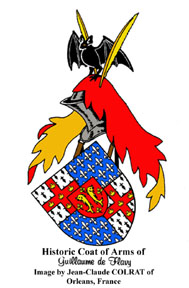 Tuesday, the 23rd – Jehanne rides all night through a forest to arrive at Compiegne before dawn and slip into town with her men. The journey is all the more remarkable, as the moon was only one day old. She hears Mass, rests and consults with de Flavy, the governor the city. Later that day she and her troops go out to meet the Burgundians. De Flavy provides cover for a possible retreat with archers and men with crossbows and culverines at the gates, as well as archers and more crossbows bobbing in boats in the river. From a chronicler:
Tuesday, the 23rd – Jehanne rides all night through a forest to arrive at Compiegne before dawn and slip into town with her men. The journey is all the more remarkable, as the moon was only one day old. She hears Mass, rests and consults with de Flavy, the governor the city. Later that day she and her troops go out to meet the Burgundians. De Flavy provides cover for a possible retreat with archers and men with crossbows and culverines at the gates, as well as archers and more crossbows bobbing in boats in the river. From a chronicler:
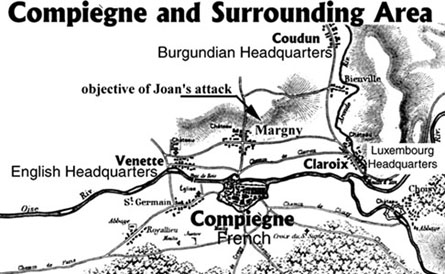
"She mounted her horse, armed as would a man, and adorned in a doublet of rich cloth-of-gold over her armor. She rode a gray coursier, very handsome and very proud, and displayed herself in the armor and manners that a captain who led a large army would. And in that state, with her standard raised high and blowing in the wind, and accompanied by many noble men, around four hours after midday, she charged out of the town. As soon as she came, the enemy was pushed back and put to flight. The Maid charged forward strongly into the Burgundian army. She drove them back twice, all the way to the Burgundian camp, and a third time halfway back. And the English who were there cut her and her men off, coming between her and the boulevard, and so her men retreated. They placed themselves between the bridge into the town and the Maid and her company. And one party among those of the Burgundians turned toward the Maid in such great number that those of her company could not hope to save her. And they spoke to the Maid, "Take pains to return to the town, or you and we will be lost!" When the Maid heard them say this, she spoke to them angrily: "You be quiet! Their defeat depends on you. Think only of striking at them." Even though she said this, her men did not want to believe it. They withdrew into the fields on her flank. When the Burgundians and English saw that she was trying to return to the town, with a great effort, they came to capture the bridge. And there was a great clash of arms. The captain of the place (Guillaume de Flay), seeing the great multitude of Burgundians and English about to enter the bridge, for fear that he would lose the place, had the bridge raised and the gate shut. Then the Maid, surpassing the nature of a woman, took on a great force, and took much pain to save her company from defeat, remaining behind as the leader and as the bravest of the troop. When the enemy saw this all tried hard to capture her. She resisted very strongly against them, and in the end had to be taken by five or six together, one putting his hand on her, the others on her horse, each of them saying "surrender yourself to me and me your promise (not to flee)." She responded, "I will swear give my promise to someone other than you and I give an oath to him." An archer grabbed her by her gold vest and pulled her from her horse. Her soldiers tried to assist her to become remounted. But a man-at –arms named the Bastard of Wandomme, who arrived just when she fell, so pressed near her, that she gave him her promise (surrendered to him), because he said that he was a nobleman.

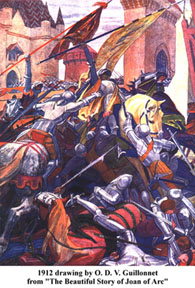
Jehanne’s first charge had been seen from the heights above the city by Luxembourg and de Crequi, who sent a message back to Clairoix to send reinforcements.
Jehanne is taken to Clairoix (about five miles away) for a few days and then to Beaulieu. Along the 25-mile journey, near the village of Elincourt, there was a priory dedicated to St. Margaret. Jehanne receives permission to go and kneel in veneration to the one whose voice she said she had heard. Her brother Pierre is also taken prisoner (he will eventually be ransomed several years later). Jean d’Aulon was also taken prisoner and allowed to continue to attend to her. The Duke of Burgundy himself comes to see Jehanne, but there is no record of what was said at their meeting.